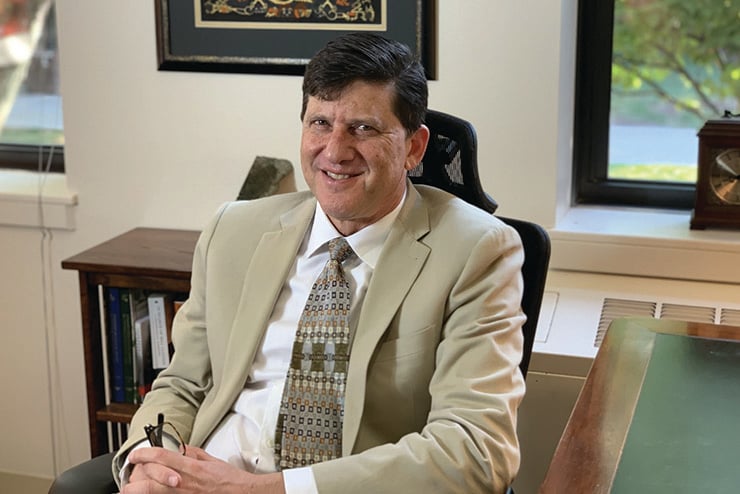It’s official: Donald Trump is mentally foregone and must be removed from office. So claims an army of mental health specialists bent on saving the country from the once-again president and his supporters.
During the 2024 presidential campaign, John Gartner, a clinical psychologist and a leader in this effort, asserted that Trump suffers from three distinct mental disorders: malignant narcissistic personality disorder, hyper manic temperament, and dementia. Gartner said Trump is just an id (in psychoanalysis, the part of the unconscious mind driven by instinctual needs) “with no cortex to direct it, and think how dangerous that could be.”
Welcome to the New Therapeutic Regime, where public service and coercive counseling operate in tandem. Paul Gottfried recognized as much a couple of decades ago in his book Multiculturalism and the Politics of Guilt: Toward a Secular Theocracy. “Social ideologues working hand in glove with the state, have been able to depict unfashionable thinkers and retrograde views as ‘pathological,’” Gottfried wrote. “Those who express ‘prejudice,’ or who try to open questions that the political class has decided to close, do so presumably because they are ‘sick.’”
This mission has a long pedigree. Soviet-era Russia made a science of it right to the end. The orders came from the top. As Nikita Khrushchev stated back in 1959:
A crime is a deviation from the generally recognized standards of behavior frequently caused by mental disorder. Can there be diseases, nervous disorders among certain people in Communist society? Evidently yes. If that is so, then there will also be offenses that are characteristic for people with abnormal minds… To those who might start calling for opposition to Communism on this basis, we can say that…clearly the mental state of such people is not normal.
Khrushchev’s idea of reform, then, did not veer from Stalinist ends, only their means. Purges and executions, with attendant bad publicity, were an inefficient way of suppressing dissent. Psychiatry promised something better. Who needed firing squads if shrinks could do the job better?
Sending people to a psychiatric institution is particularly practical because hospitalization has no end and thus, if need be, people can be locked away forever, or as long as they continue to have views that are considered politically or socially dangerous, or remain inconvenient to the authorities…
In a 2018 article in the BJPsych Bulletin titled “Ending political abuse of psychiatry,” Dutch-born human rights activist and historian Robert van Voren explained why the mental health industry is such an attractive tool for authoritarian regimes:
Sending people to a psychiatric institution is particularly practical because hospitalization has no end and thus, if need be, people can be locked away forever, or as long as they continue to have views that are considered politically or socially dangerous, or remain inconvenient to the authorities… Declaring a person mentally ill presents a perfect opportunity not to have to respond to their political or religious convictions, as they are the product of an ill mind and do not have to be taken seriously.
China has retained its enthusiasm for this method of persuasion. In 2022, a report issued by the Pan-Asian human rights group Safeguard Defenders titled “Drugged and Detained: China’s Psychiatric Prisons” exposed the “widespread and routine” forced confinement of Chinese dissidents in psychiatric wards. The “therapy” they received included “arbitrary detention, beatings, forced medication, electroconvulsive therapy and repeated incarceration.”
America remains a long way off from such abominations. We’re still in the talking stages. But, at an accelerating pace, prominent therapists are hinting at dark motives. Their central reference point, needless to say, is Donald Trump.
Ever since President Trump’s first term began, the professions of psychiatry, psychology, and social work have expressed a desire to cleanse the nation of Trump and his malign influence. Believing their training uniquely qualifies them to locate evil and its consequences, therapists have become a potent source of moral authority. Their conclusions, if fully realized, could produce the very totalitarianism that Trump allegedly practices.
The most outspoken of these scolds, ironically, is a “conservative” lawyer and pitchman for these therapists. That would be George Conway, the now ex-husband of first-term Trump White House counselor Kellyanne Conway. Last summer, he launched a political action committee, Anti-Psychopath PAC, to protect our nation’s mental health from a second Trump presidency.
Anti-Psychopath PAC, he states, “was founded for one reason: to make the case to voters that Donald Trump is a narcissist and a sociopath.” During the 2023-24 election cycle, this would-be John the Baptist’s political action committee spent more than $2.7 million on federal elections, all of it against Republicans (though not “for” Democrats). With respect to the presidential election, its activities included posting billboards near Trump’s Mar-a-Lago estate, producing a video spot, and circulating an open letter and petition to mental health specialists that The New York Times saw fit to publish.
The effort has failed, for now. But during the campaign, it did attract the attention of pearl-clutching pathologists. By last October, 233 mental health professionals had signed Conway’s petition, which read in part:
[We] have an ethical duty to warn the public that Donald Trump is an existential threat to democracy. His symptoms of severe, untreatable personality disorder—malignant narcissism—makes him deceitful, destructive, deluded, and dangerous. He is grossly unfit for leadership.
The above-mentioned John Gartner, the lead signatory, told the Huffington Post that a second Trump presidency could lead to outright totalitarianism:
We have a duty to warn the public about the grave danger posed by returning this man to power. Trump’s conduct recalls that of some of history’s brutal dictators, and he has already demonstrated his willingness to wield state power to hurt his enemies without remorse. Let this be a warning.
Gartner has made a side career out of this gambit. And he thinks politically. In early 2017, he circulated a petition, “Mental Health Professionals Declare Trump is Mentally Ill and Must Be Removed,” forwarding it to Senate Minority Leader Charles Schumer (D-N.Y.). Eventually collecting over 41,000 signatures, the petition asserted essentially the same diagnosis of Trump as seriously mentally ill and dangerous as Conway’s later petitions.
Dr. Gartner was disappointed over the lack of lawmaker resolve to invoke the 25th Amendment, which allows Congress to declare a president “unable to discharge the powers and duties of his office.” He kept himself busy during Trump’s first term by conjuring visions of nuclear war. In 2018, he and two colleagues edited a book of 23 essays, Rocket Man: Nuclear Madness and the Mind of Donald Trump.
The chapter titles alone reveal Gartner’s intent:
- Chapter 3, by retired Air Force major Steven Buser: “If President Trump Were Airman Trump, I Would Not Certify Him Psychologically Fit to Handle Nuclear Weapons.”
- Chapter 6, by Dr. Lance Dodes, a psychoanalyst: “A Man with No Humanity Has the Power to Destroy Mankind”
- Chapter 13, by Seth Norrholm, a neuroscientist: “One Week in August: How a Self-Made Nuclear Crisis Exposed Donald Trump’s Psychopathology”
Not too subtle, are they?
Rocket Man was a hit with clinicians at prestigious universities, who gave the book fawning blurbs. “A president whose grandiosity, paranoia and impulsivity are constantly on display has alarmed the public,” said Harvard’s Henry Friedman. “Rocket Man offers a chance to approach Donald Trump through the eyes of astute psychotherapists and other experts—a must-read for anyone concerned about his dangerous leadership,” rhapsodized Justin Frank of George Washington University. “These distinguished thinkers and therapists grapple with the president’s confusing inner life and its potential manifestations into political and nuclear chaos,” declared Richard Munich of Cornell University.
Gartner has been all over the media, including “Jen Rubin’s Green Room,” a weekly video program hosted by neoconservative lawyer-blogger Jennifer Rubin, whose resentment of Donald Trump is unsurpassed. On the show’s Aug. 28, 2024 segment, Gartner asserted that Trump has dementia because he is unable to align language with reality.
Arguably the most significant element of Gartner’s obsession with Trump’s mental illnesses is a group he founded in 2017, Duty to Warn. Its backstory is crucial.
In 1973, the American Psychiatric Association’s (APA) guidebook, Principles of Medical Ethics, included Section 7, better known as the “Goldwater rule.” The move was intended to discourage members from making public statements about a person’s mental state in absence of an examination.
Belatedly prompting this move was a national poll of psychiatrists published in the September-October 1964 issue of Fact, a short-lived magazine, on the issue of then-Republican presidential candidate Barry Goldwater’s mental fitness. Fully 1,189 of the respondents believed him unfit to serve. Senator Goldwater sued the publishers in federal court for defamation (Goldwater v. Ginzburg), and in July 1969 a jury awarded him a single dollar in compensatory damages and $75,000 in punitive damages. The decision would be upheld by a circuit court and denied review by the Supreme Court.
With the Goldwater rule in effect, APA members have refrained from making hasty diagnoses. But the rise of Donald Trump to the presidency has shifted the Overton window. Mental health professionals, increasingly radicalized, have now forgotten about the Goldwater rule and routinely denounce Trump as a head case. In response, in March 2017 the association’s Ethics Committee reaffirmed the rule.
Gartner and his allies were incensed by the APA’s move and viewed it as a gag order. For them, the dangers of Donald Trump’s presidency rendered discretion irrelevant. That April, Duty to Warn held a conference at the Yale School of Medicine, and months later published the proceedings in book form, The Dangerous Case of Donald Trump: 27 Psychiatrists and Mental Health Experts Assess a President.
The volume’s editor, Bandy X. Lee, then a professor of forensic psychiatry at Yale, led this collective denunciation of Trump as a “clear and present danger” to national and individual mental health. Like a contagion, the authors argued, Trump’s mental illnesses, if unchecked, could spread to all of America. One contributor, Robert Jay Lifton, a renowned expert on brainwashing, termed this process “malignant normalcy.”

The book quickly became a bestseller. Indeed, an expanded edition containing 10 additional essays would be published in 2019. Another expanded edition was published in 2024, just in time for the election.
Lee, a Korean-American woman born in 1970, might be even more zealous than Conway or Gartner. Following a stormy departure from Yale in 2020 (after which she comfortably landed at Harvard), Lee has ramped up “public safety” warnings. In a Jan. 11, 2021, interview with Scientific American, she assessed the Capitol “insurrection,” noting a dangerous relationship between Trump and his followers:
When a highly symptomatic individual [like Trump] is placed in an influential position, the person’s symptoms can spread through the population through emotional bonds, heightening existing pathologies and inducing delusions, paranoia and propensity for violence—even in previously healthy individuals. The treatment is removal of exposure.
In response to a question about the prospects for recovery among Trump’s supporters, Dr. Lee poured on the sympathy:
If we handle the situation appropriately, there will be a lot of disillusionment and trauma. And this is all right—they are healthy reactions to an abnormal situation. We must provide emotional support for healing, and this includes societal support, such as sources of belonging and dignity. Cult members and victims of abuse are often emotionally bonded to the relationship, unable to see the harm that is being done to them. After a while, the magnitude of the deception conspires with their own psychological protections against pain and disappointment. This causes them to avoid seeking the truth. And the situation with Trump supporters is very similar.
But what if those supporters don’t want to be “healed?” What sort of trauma could they expect? With Donald Trump back in the saddle, Lee will have plenty of time to ponder such issues as founder and president of the World Mental Health Coalition, “the largest professional organization to address the problem of dangerous leadership and its contribution to a “mental health pandemic.”
The coalition’s motto is “For a safer world.” That’s reason enough to worry about its activities. With insufferable moral self-righteousness (and some bad prose), Lee summarizes her group’s history and mission:
The book [The Dangerous Case of Donald Trump] became an unprecedented New York Times bestseller of its kind, speaking to the hunger of the public, and we donated all revenues to the public good so as to remove any conflict of interest. The featured authors represent only a small sample of the many thousands of mental health professionals who came forth in historically unprecedented ways. Together we formed the National Coalition, which became the World Mental Health Coalition (WMHC) with international membership, by the end of 2017. It is the only professional organization to address the issue of organization of mental health professionals to speak up about the dangerous mental impairments of Donald Trump. While the alarm of the moment brought us together, our mission is broader: to promote societal mental health and wellbeing in general.
Isn’t it comforting to know that revenue from the book’s sales are used to promote the “public good?”
For several years, Lee and her compatriots have been taking their grievances to the political arena. She recounts:
Since the first Yale conference, Congress members have reached out to us, and eventually we met with over fifty lawmakers on Capitol Hill. They encouraged us to educate the public medically so that they could act politically. We were initially very successful, raising the issue of the president’s mental health to become the number one topic of national conversation. Many of us were interviewing with the media many hours a day, every day, and the public was listening.
Some of these lawmakers have acted politically. In February 2021, as the nation was canonizing George Floyd, Sen. Elizabeth Warren (D-Mass.) and Reps. Barbara Lee (D-Calif.) and Ayanna Pressley (D-Mass.) introduced the Anti-Racism in Public Health Act, which declared “structural racism” a public health crisis. The measure would have dramatically expanded the authority of the Centers for Disease Control and Prevention to reduce group health disparities. Luckily, neither that bill nor a reintroduced version in 2023 went anywhere.
“You’re not going to get Bernie to say ‘gulags,’ but like I’m all aboard for gulags,” said Jurek, who described himself as an anarcho-communist. “I feel as though there needs to be reeducation for a significant portion of our society.”
In New York State, meanwhile, Democratic Governor Kathy Hochul in December 2021 declared racism a “public health crisis” during a bill-signing ceremony. “For too long,” she said, “communities of color in New York have been held back by systemic racism and inequitable treatment.”

published by writers
affiliated with Dr. Bandy
Lee’s World Mental Health
Coalition.
So far, reformers have focused on equalizing racial outcomes rather than punishing “harmful” individuals and organizations. But suppose they shift their focus to the “rehabilitation” of opponents of equality? As first-person accounts of the Soviet gulag system by Aleksandr Solzhenitsyn, Vladimir Bukovsky, Pyotr Grigorenko, and other former prisoners eloquently attest, the enforcers of this reeducation did more than follow psychological brainwashing protocols; they honed them. That which post-World War II Stalin set in motion, Khrushchev and Brezhnev perfected.
But that was Soviet Russia, right? It was so long ago. Gulags couldn’t happen here anyway. We’re a free country. Nothing to worry about…
The wiser among us know better. The stigmatizing and therapeutical incarceration of Trump’s MAGA followers as sufferers of mental illness can happen here. The possibilities appeal to a large pool of left-wingers, itching to flatter themselves for being on the “Right Side of History.”
In January 2020, an Iowa field organizer for Bernie Sanders’ presidential campaign, Kyle Jurek, was caught on Project Veritas undercover video footage expressing a desire to put Trump supporters in labor camps if Sanders won. “You’re not going to get Bernie to say ‘gulags,’ but like I’m all aboard for gulags,” said Jurek, who described himself as an anarcho-communist. “I feel as though there needs to be reeducation for a significant portion of our society.”
Judging from their outraged social media posts following the reelection of Trump, many on the left seem to agree. Do they include the likes of John Gartner and Bandy Lee, who have the medical qualifications to back up their political diagnoses? They’re not talking.

Leave a Reply